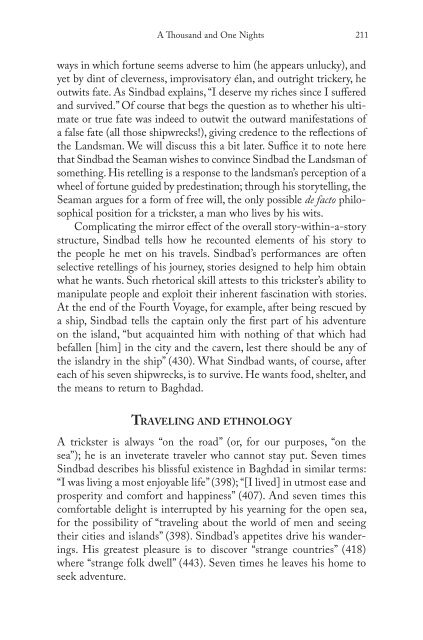Blooms Literary Themes - THE TRICKSTER.pdf - ymerleksi - home
Blooms Literary Themes - THE TRICKSTER.pdf - ymerleksi - home
Blooms Literary Themes - THE TRICKSTER.pdf - ymerleksi - home
Create successful ePaper yourself
Turn your PDF publications into a flip-book with our unique Google optimized e-Paper software.
A Th ousand and One Nights 211<br />
ways in which fortune seems adverse to him (he appears unlucky), and<br />
yet by dint of cleverness, improvisatory élan, and outright trickery, he<br />
outwits fate. As Sindbad explains, “I deserve my riches since I suff ered<br />
and survived.” Of course that begs the question as to whether his ultimate<br />
or true fate was indeed to outwit the outward manifestations of<br />
a false fate (all those shipwrecks!), giving credence to the refl ections of<br />
the Landsman. We will discuss this a bit later. Suffi ce it to note here<br />
that Sindbad the Seaman wishes to convince Sindbad the Landsman of<br />
something. His retelling is a response to the landsman’s perception of a<br />
wheel of fortune guided by predestination; through his storytelling, the<br />
Seaman argues for a form of free will, the only possible de facto philosophical<br />
position for a trickster, a man who lives by his wits.<br />
Complicating the mirror eff ect of the overall story-within-a-story<br />
structure, Sindbad tells how he recounted elements of his story to<br />
the people he met on his travels. Sindbad’s performances are often<br />
selective retellings of his journey, stories designed to help him obtain<br />
what he wants. Such rhetorical skill attests to this trickster’s ability to<br />
manipulate people and exploit their inherent fascination with stories.<br />
At the end of the Fourth Voyage, for example, after being rescued by<br />
a ship, Sindbad tells the captain only the fi rst part of his adventure<br />
on the island, “but acquainted him with nothing of that which had<br />
befallen [him] in the city and the cavern, lest there should be any of<br />
the islandry in the ship” (430). What Sindbad wants, of course, after<br />
each of his seven shipwrecks, is to survive. He wants food, shelter, and<br />
the means to return to Baghdad.<br />
TRAVELING AND ETHNOLOGY<br />
A trickster is always “on the road” (or, for our purposes, “on the<br />
sea”); he is an inveterate traveler who cannot stay put. Seven times<br />
Sindbad describes his blissful existence in Baghdad in similar terms:<br />
“I was living a most enjoyable life” (398); “[I lived] in utmost ease and<br />
prosperity and comfort and happiness” (407). And seven times this<br />
comfortable delight is interrupted by his yearning for the open sea,<br />
for the possibility of “traveling about the world of men and seeing<br />
their cities and islands” (398). Sindbad’s appetites drive his wanderings.<br />
His greatest pleasure is to discover “strange countries” (418)<br />
where “strange folk dwell” (443). Seven times he leaves his <strong>home</strong> to<br />
seek adventure.

















